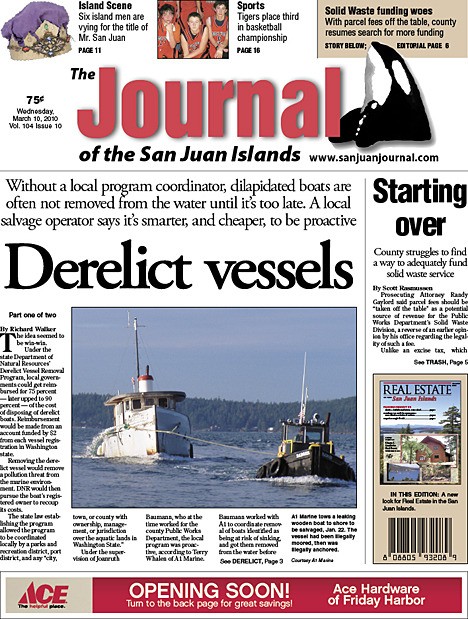Prosecuting Attorney Randy Gaylord said parcel fees should be “taken off the table” as a potential source of revenue for the Public Works Department’s Solid Waste Division, a reverse of an earlier opinion by his office regarding the legality of such a fee.
Unlike an excise tax, which Gaylord said can be used to generate solid waste revenue, there is no solid waste-related transaction on which such a parcel fee can be attached. Furthermore, he said, there’s no link between the impact a property owner has on the solid waste operation and the amount each would pay under that one-size-fits-all type of fee.
In addition, no county in Washington state has a parcel fee to support solid waste. “I’m not aware of another county that does it,” Gaylord told the County Council March 2.
A fee on developed parcels was among the financing tools recommended by the Solid Waste Advisory Committee. At $48, the committee’s suggested amount, it was expected to generate roughly $450,000 a year in new revenue. The prospects of such a fee had gained traction with a majority of County Council members, though in varying degrees. It was seen as a stable source of funding that the Solid Waste Division could bank on.
Trying to balance the expenses of the solid waste utility on tipping fees alone has long been a problem. When trash volumes decrease, revenues decrease and the utility can’t meet its expenses.
The Solid Waste Advisory Committee came up with a funding plan that establishes a parcel fee and a gate, or per-visit, fee of $5. Under the plan, tipping fees would decrease. The idea behind reducing tipping fees in place of an established fee is to shift revenue for capital costs from tipping fees — which fluctuate and are unpredictable — to a steady source.
Calvin Den Hartog, owner of San Juan Sanitation and a member of the Solid Waste Advisory Committee, said in August that the solid waste utility should be treated like other utilities; electrical, phone and water utilities charge a base rate and a rate based on use. The base rate pays the costs of making the service available; the use rate pays the cost of the customer’s actual use.
With parcel fees off the table, County Councilman Rich Peterson, North San Juan, said a property tax appears to be the only stable financing option left. The council, he said, should find out as soon as possible what it will take to get such a measure before the voters.
“It’s pretty shocking news for all of us,” Peterson said of the latest legal opinion. “We have two elections coming up this year. We need to get something on the soonest ballot we can.”
In the meantime, the council agreed that additional cost-cutting steps should be explored, such as further cuts in service and a possible shutdown of the San Juan and Lopez solid waste transfer stations. Such a move, Public Works Director Jon Shannon said, would likely require a switch to mandatory roadside pickup of garbage and recycling on Lopez and San Juan, and the hauling of that refuse to the Orcas Island solid waste transfer station for processing.
County Councilman Howard Rosenfeld told the Friday Harbor Town Council on Thursday that closing the Lopez and San Juan solid waste transfer stations is unlikely. He noted that several areas of San Juan Island cannot be served by roadside pickup because of terrain.
The council was expected to begin its cost-cutting exploration Tuesday.
Shannon said closing two transfer stations would help alleviate an immediate “cash flow” shortage and buy more time to come up with a stable source of funding for an operation financed almost exclusively by tipping fees. He said the Solid Waste Division is $700,000 in the hole, mostly in capital spending. Service has been scaled back at all three waste transfer stations to offset a 20-percent drop in the amount of garbage collected over the past 18 months.
“It’s probably not going to get much community support,” Shannon said of the proposed closure. “But from a financial point of view, that solves the problem.”
It could create other problems, however. County Administrator Pete Rose said it might create a “big problem” for the Town of Friday Harbor, which collects garbage and recycling at the homes and businesses in its boundaries and then uses the facility on Sutton Road to dispose of it. The town is the county’s second-largest customer.
Although parcel fees are no longer an option, Shannon cautioned the council about trying to solve Solid Waste’s funding woes solely by raising rates. Even now, local tipping fees — the price one pays to dispose of trash — are the state’s highest, he said. And there’s a point at which the county’s larger customers and many islanders will decide it’s more cost-effective to take their trash off-island and dispose of it on the mainland.
Shannon encouraged the council to look for a solution that works for the solid waste operation and the community as well.
“There should be more to it than just the dollars and cents,” he said. “It has to be one the community supports.”
— Editorial: The Journal of the San Juan Islands endorses the funding plan recommended by the Solid Waste Advisory Committee in August. See Opinion, page 6, in the March 10 edition.





